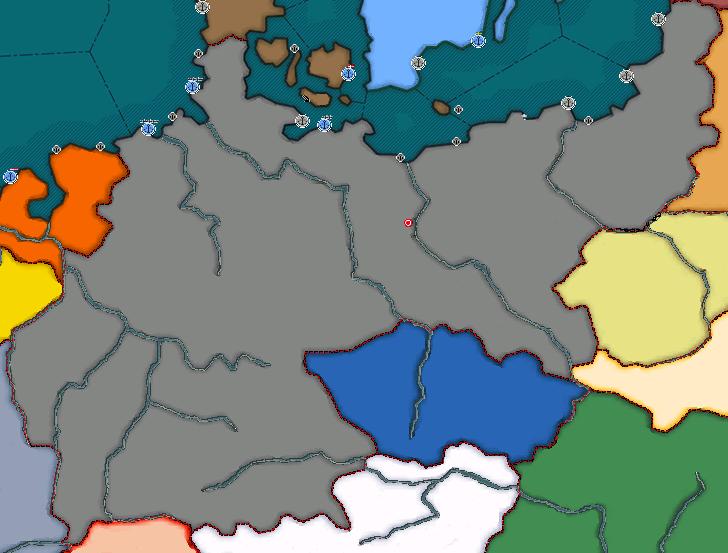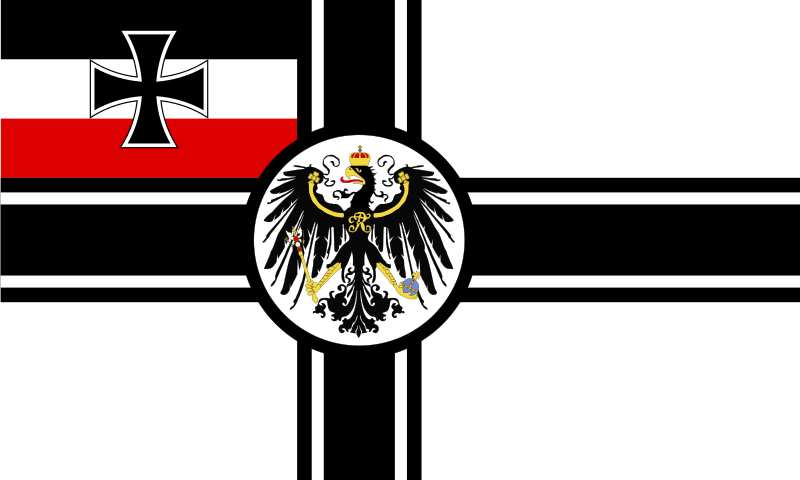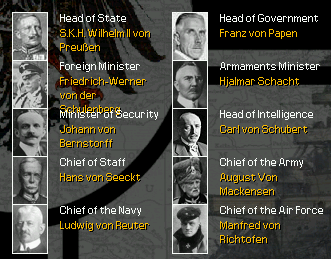Germany
From Kaiserreich
MaskedPickle (Talk | contribs) |
MaskedPickle (Talk | contribs) (→Politics) |
||
| Line 62: | Line 62: | ||
'''Commander of Luftstreitkräfte''': baron Manfred von Richtofen (Standischer Verbund, born 2 May 1892) | '''Commander of Luftstreitkräfte''': baron Manfred von Richtofen (Standischer Verbund, born 2 May 1892) | ||
| + | |||
| + | == Constituent states of the Reich: == | ||
| + | |||
| + | ''-Kingdoms of Prussia, Bavaria, Saxony and Wurtemberg'' | ||
| + | |||
| + | ''-Grand duchies of Luxemburg, Baden, Hesse, Mecklenburg-Schwerin, Mecklenburg-Strelitz, Oldenburg and Saxe-Weimar-Eisenach'' | ||
| + | |||
| + | ''-Duchies of Anhalt, Brunswick, Saxe-Altenburg (Sachsen-Altenburg), Saxe-Coburg and Gotha and Saxe-Meiningen'' | ||
| + | |||
| + | ''-Principalities of Lippe, Reuss, junior line, Reuss, senior line, Schaumburg-Lippe, Schwarzburg-Rudolstadt, Schwarzburg-Sondershausen andc Waldeck-Pyrmont'' | ||
| + | |||
| + | ''-Free Hanseatic cities of Bremen, Hamburg and Lübeck'' | ||
| + | |||
| + | ''-Reichslands of Alsace-Lorraine and Liège'' | ||
| + | |||
| + | == German political parties == | ||
== Constituent states of the Reich: == | == Constituent states of the Reich: == | ||
Revision as of 13:14, 3 October 2007
Germany, or officially German Empire (German: Deutsches Reich)is a country in West-Central Europe. It is bordered to the north by the North Sea, Denmark, and the Baltic Sea; to the east by Poland and Lithuania; to the south by Austria-Hungary and Switzerland; and to the west by Commune of France, Flanders-Wallonia, and the Netherlands.
German Empire is a semi-constitutional monarchy composed by twenty-eight states, ruled by the king of Prussia: the Empire was proclaimed on January, 18 1871 in the Hall of Mirrors of Palace of Versailles in the aftermath of the Franco-Prussian War of 1871. It gained a huge overseas empire after the Weltkrieg, and stays as the main winner of this one. Now head of the main alliance in Europe, the Mitteleuropa, consisting of authoritarian constitutional monarchies ruled by German monarchs, the German Empire is facing the risks of economic crisis, the rivalry of other empires and syndicalist wills of spreading and revenge...
(Need much more text)
Contents |
General informations
Official name: Deutsches Reich (German Empire)
Motto: Gott mit uns (God with us)
Anthem: Heil dir im Siegerkranz
Capital: Berlin
Official language: German
Type of government: Constitutional monarchy
Date of unification of German Empire: 18 January 1871
Area (without colonial empire): More than 543.000 km²
Population (without colonial empire): around 73 millions
Currency: Papiermark
History
In March 1919, after three and a half years of attritional warfare, the German offensive on the Western Front finally succeeded in overrunning the Entente defences. French morale collapsed along with her army against the onslaught as the Reichswehr exploited the breakthrough and marched towards Paris and the Loire valley. As the army collapsed the exhausted French surrendered and allowed the German army to occupy their proud nation. Following this stunning victory, German troops were rapidly sent to the existing Italian and Turkish fronts and forced entry into the lightly defended parts of northwestern Italy. With the arrival of these veteran troops, the Central Powers defeated both the British and Italian armies, restoring Ottoman power in the Middle East and occupying Northern Italy. The war with Britain and the remaining Entente forces overseas dragged on inconclusively until 1921 when a “peace with honour” was secured, ending the Weltkrieg. Not everything was well within Germany though - 7 years of war had pushed her population to the brink of starvation, German industry stagnated following the wars end as demand was slashed and the costs to the government mounted as they were forced to subsidise conversion back to domestic production, struggled to feed its population and fought the ever-present danger of inflation that had arisen from printing money to fund the war effort. In 1924, Admiral Tirpitz became Chancellor and his policies started a golden age of German Weltpolitik, bringing the economy under control through regulating the markets, subsidising food imports with money gained from reparations and the sale of technology to Germany’s allies and client-states. Tirpitz’s hugely successful regime culminated in the well-executed occupation of British colonial possessions following the outbreak of the British revolution and the establishment of Freistaat MittlelAfrika. However, since the Grand Admiral’s death in 1930 things have been going downhill for Germany. A general slowing of the world economy is decreasing industrial output and national income as other nations recover their manufacturing power, and growing nationalism in Germany’s eastern clients is starting to cause tensions as both populations and governments begin to drift away from the Reich. In 1936, Imperial Germany stands at a crossroads, the cracks that are beginning to appear in her mighty empire are slowly widening, and her ancestral enemies are getting stronger once more…
Politics
Germany is a federal semi-constitutional monarchy ruled by the German Kaiser (who is also King of Prussia). Although Germany has many political parties, the state policies are rather authoritarian.
Kaiser and King of Prussia: His Imperial and Royal Majesty Wilhelm II von Hohenzollern (born 27 January 1859)
Reichkanzler: Franz von Papen (Standischer Verbund, born 29 October 1879)
State Secretary for Foreign Affairs: count Friedrich Werner von der Schulenburg (Standischer Verbund, born 20 November 1875)
State Secretary for Finance: Doctor Hjalmar Schacht (IHK-Mitteleuropa, born 22 January 1877)
State Secretary for the Interior: count Johann Heinrich von Bernstorff (Standischer Verbund, born 14 November 1862)
Head of Abwehr: Carl von Schubert
Chief of the German General Staff: marshal Hans von Seeckt (Grosser Generalstab, born 22 April 1866)
Commander of Reichsheer: marshal August von Mackensen (Grosser Generalstab, born 6 December 1849)
Commander of Kaiserliche Marine: admiral Ludwig von Reuter (Grosser Generalstab, born 9 February 1869)
Commander of Luftstreitkräfte: baron Manfred von Richtofen (Standischer Verbund, born 2 May 1892)
Constituent states of the Reich:
-Kingdoms of Prussia, Bavaria, Saxony and Wurtemberg
-Grand duchies of Luxemburg, Baden, Hesse, Mecklenburg-Schwerin, Mecklenburg-Strelitz, Oldenburg and Saxe-Weimar-Eisenach
-Duchies of Anhalt, Brunswick, Saxe-Altenburg (Sachsen-Altenburg), Saxe-Coburg and Gotha and Saxe-Meiningen
-Principalities of Lippe, Reuss, junior line, Reuss, senior line, Schaumburg-Lippe, Schwarzburg-Rudolstadt, Schwarzburg-Sondershausen andc Waldeck-Pyrmont
-Free Hanseatic cities of Bremen, Hamburg and Lübeck
-Reichslands of Alsace-Lorraine and Liège
German political parties
Constituent states of the Reich:
-Kingdoms of Prussia, Bavaria, Saxony and Wurtemberg
-Grand duchies of Luxemburg, Baden, Hesse, Mecklenburg-Schwerin, Mecklenburg-Strelitz, Oldenburg and Saxe-Weimar-Eisenach
-Duchies of Anhalt, Brunswick, Saxe-Altenburg (Sachsen-Altenburg), Saxe-Coburg and Gotha and Saxe-Meiningen
-Principalities of Lippe, Reuss, junior line, Reuss, senior line, Schaumburg-Lippe, Schwarzburg-Rudolstadt, Schwarzburg-Sondershausen andc Waldeck-Pyrmont
-Free Hanseatic cities of Bremen, Hamburg and Lübeck
-Reichslands of Alsace-Lorraine and Liège
Military
Colonial empire
(Needs improvement)
German colonial possessions in Europe: Crete
German colonial possessions in Africa: Freistaat Mittelafrika, Suez Canal
German colonial possessions in Asia: Allgemeine Ostasiatische Gesellschaft, German Indochina, Qingdao
German colonial possessions in Oceania:




